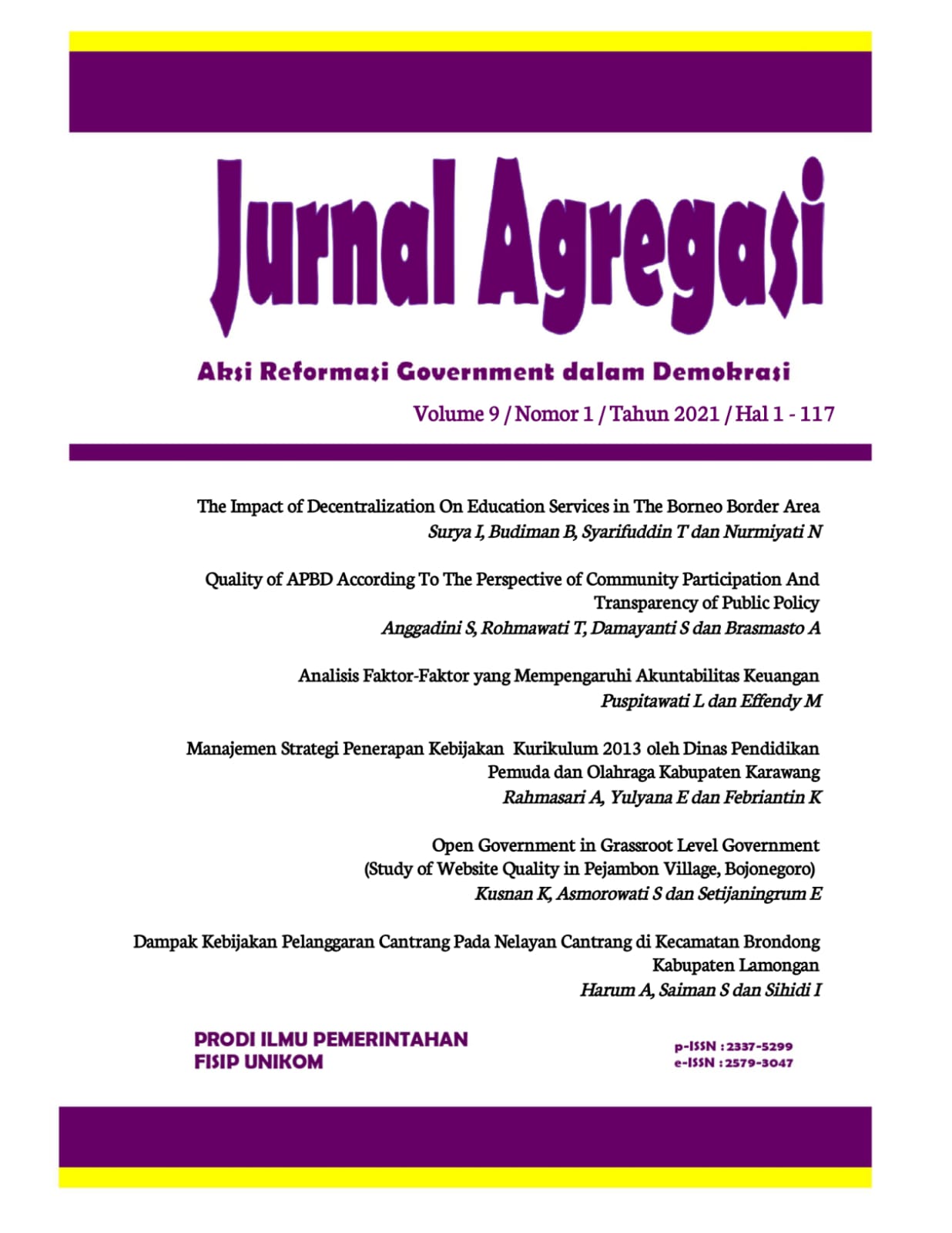THE IMPACT OF DECENTRALIZATION ON EDUCATION SERVICES IN THE BORNEO BORDER AREA
DOI:
https://doi.org/10.34010/agregasi.v9i1.4121Keywords:
Decentralization, Education Services, Kalimantan BorderAbstract
The research problem raised in this paper is seeing how the impact of education decentralization in the border area of ​​Kalimantan Island. This study also aims to see how the implementation of decentralization policies for education services in the Kalimantan border area. The results of this study state that the implementation of decentralization has no significant effect on education services in border areas. This is based on the fact that educational facilities such as school units, teaching staff, and public awareness of going to school are still very worrying. The centralized civil servant recruitment system creates a separate obstacle for local governments to facilitate the fulfillment of teaching staff in border areas. Poor education services in the border areas of Kalimantan have resulted in the occurrence of hummand trafficking against children, the large number of people who choose to exodus, and the fading of the nationalism of border children who attend school in Malaysia. Thus, decentralization has not been able to maximize control over public services and achieve equal distribution of services throughout the country and democratic welfare of the people. Everything is still in terms of efforts with not optimal results.
Keywords: Decentralization, Education Services, Kalimantan Border.
Downloads
References
A’ing, A. (2015). Studi Tentang Pembangunan Bidang Pendidikan di Daerah Perbatasan Kecamatan Kayan Hulu Kabupaten Malinau. Pemerintahan Integratif, 3(4), 545–559. Retrieved from http://jurnal.stitnualhikmah.ac.id/index.php/modeling/article/view/33
Acemoglu, D., & Robinson, J. A. (2012). Why Nations Fail : the origins of power, prosperity, and poverty (1st Editio). New York: Crown Publishers.
Auldina, L. (2016). Marginalisasi Pendidikan Di Daerah Perbatasan ( Studi Kasus Di Desa Mapur Kecamatan Bintan Pesisir Kabupaten Bintan Provinsi Kepulauan Riau ). 1–20.
Aulia, S. (2012). Desentralisasi Kebijakan Pendidikan (Studi Tentang Pelaksanaan Wajib Belajar 12 Tahun Di Kota Surabaya Pada Tingkat Pendidikan Menengah dan Kejuruan). Jurnal Politik Muda, 2(1), 204–216.
Badan Pusat Statistik Kabupaten Malinau. (2010). Kabupaten Malinau Dalam Angka Tahun 2010. Retrieved from https://malinaukab.bps.go.id/publication/2010/12/06/7874cca9f1c13f1f91393799/kabupaten-malinau-dalam-angka-tahun-2010.html
Badan Pusat Statistik Kabupaten Malinau. (2011). Kabupaten Malinau Dalam Angka Tahun 2011. Retrieved from https://malinaukab.bps.go.id/publication/2011/08/15/df21da3b3f169a59f1835b34/kabupaten-malinau-dalam-angka-tahun-2011.html
Badan Pusat Statistik Kabupaten Malinau. (2015). Kabupaten Malinau Dalam Angka Tahun 2015. Retrieved from https://malinaukab.bps.go.id/publication/2015/11/02/fb395101bc56777285f94846/kabupaten-malinau-dalam-angka-2015.html
Badan Pusat Statistik Kabupaten Malinau. (2016). Kabupaten Malinau Dalam Angka Tahun 2016. Retrieved from https://malinaukab.bps.go.id/publication/2016/07/15/79ecf4279034c4b5e2f9532d/kabupaten-malinau-dalam-angka-2016.html
Badan Pusat Statistik Kabupaten Malinau. (2017). Kabupaten Malinau Dalam Angka Tahun 2017. Retrieved from https://malinaukab.bps.go.id/publication/2017/08/11/f45f05e45a16d8e7d7ebc95a/kabupaten-malinau-dalam-angka-2017.html
Badan Pusat Statistik Kabupaten Malinau. (2018). Kabupaten Manilau dalam Angka Tahun 2018 (p. 366). p. 366. Retrieved from https://malinaukab.bps.go.id/publication/2018/08/16/c8ea3f18a363ed6787541616/kabupaten-malinau-dalam-angka-2018.html
Badan Pusat Statistik Kabupaten Malinau. (2019). Kabupaten Malinau Dalam Angka Tahun 2019. Retrieved from https://malinaukab.bps.go.id/publication/2019/08/16/0e15c2bc87f7443b736145ad/kabupaten-malinau-dalam-angka-2019
Badan Pusat Statistik Kabupaten Sanggau. (2010). Kecamatan Entikong dalam Angka Tahun 2010. Retrieved from https://sanggaukab.bps.go.id/publication/2011/11/07/8784784f935d5214edd5e594/kecamatan-entikong-dalam-angka-2010.html
Badan Pusat Statistik Kabupaten Sanggau. (2011). Kecamatan Entikong dalam Angka Tahun 2011. Retrieved from https://sanggaukab.bps.go.id/publication/2012/02/16/8365904300ecfbef1de2f266/kecamatan-entikong-dalam-angka-2011.html
Badan Pusat Statistik Kabupaten Sanggau. (2015). Kecamatan Entikong dalam Angka Tahun 2015. Retrieved from https://sanggaukab.bps.go.id/publication/2015/12/23/795f29d093a73a6c270a8dd0/kecamatan-entikong-dalam-angka-tahun-2015.html
Badan Pusat Statistik Kabupaten Sanggau. (2016). Kecamatan Entikong dalam Angka Tahun 2016. Retrieved from https://sanggaukab.bps.go.id/publication/2016/07/29/553d12af476f20433567808c/kecamatan-entikong-dalam-angka-2016.html
Badan Pusat Statistik Kabupaten Sanggau. (2017). Kecamatan Entikong dalam Angka Tahun 2017. Retrieved from https://sanggaukab.bps.go.id/publication/2017/09/26/e1d330ec15b3af2033ae62ef/kecamatan-entikong-dalam-angka-2017.html
Badan Pusat Statistik Kabupaten Sanggau. (2018). Kecamatan Entikong dalam Angka Tahun 2018 (p. 155). p. 155. Retrieved from https://sanggaukab.bps.go.id/publication/2018/09/26/7d8177f1fcd754b999a0277e/kecamatan-entikong-dalam-angka-2018.html
Badan Pusat Statistik Kabupaten Sanggau. (2019). Kecamatan Entikong dalam Angka Tahun 2019 (p. 498). p. 498. Retrieved from https://sanggaukab.bps.go.id/publication/2019/09/26/4f6ed7d890780ecda1094b05/kecamatan-entikong-dalam-angka-2019.html
Badaruddin, N. (2017). Problematika Pendidikan Modern. MIYAH: Jurnal Studi Islam, 12(1), 19–32.
Buto, A. Z., & Hafifuddin. (2019). Perkembangan Desentralisasi Pendidikan Islam Dalam Meningkatkan Kualitas Sdm Dan Pendidikan Islam Di Wilayah Kota Lhokseumawe. Perkembangan Desentralisasi Pendidikan Islam ITQAN, 10(2), 13–28.
Fatkhuri, F. (2019). Desentralisasi Pendidikan di Indonesia : Korupsi dan Problem Politik Kekuasaan. KEMUDI : Jurnal Ilmu Pemerintahan, 3(2), 278–297. https://doi.org/10.31629/kemudi.v3i2.874
Hafifuddin. (2017). DISENTRALISASI PENDIDIKAN DALAM MENINGKATKAN KUALITAS SUMBER DAYA MANUSIA KOTA LHOKSEUMAWE. Problematika Guru Dalam Media, 8(2), 169–186.
Jailani, M. S. (2009). Guru Profesional d an Tantangan Dunia Pendidikan. Jurnal Al-Ta’lim, 21(1), 1–9. https://doi.org/10.15548/jt.v21i1.66
Junaidi. (2020). Pendidikan Di Era Otonomi Daerah Pasca Orde Baru. Kuttab, 4(1). https://doi.org/10.30736/ktb.v4i1.104
Maisyanah, M. (2018). Analisis Dampak Desentralisasi Pendidikan Dan Relevansi School Based Management. Quality, 6(2), 1. https://doi.org/10.21043/quality.v6i2.5773
Mirzaqon, A., & Purwoko, B. (2015). Studi Kepustakaan Mengenai Landasan Teori Dan Praktik Konseling Expressive Writing. 1–8.
Mufizar, Arkanudin, & Achyar, M. S. (2012). Pembangunan Sosial Masyarakat Perbatasan di Kecamatan Sajingan Besar Kabupaten Sambas Provinsi Kalimantan Barat. Jurnal PMIS-UNTAN-PSS, 1(1), 1–22.
Muhammad, A. (2016). Harmonisasi Kewenangan Antara Pemerintah Pusat Dan Daerah Dalam Penyelenggaraan Otonomi Daerah. Jurnal Supremasi, 9(2), 105/107. Retrieved from http://ojs.unm.ac.id/index.php/supremasi/article/view/2800
Nazaki. (2016). KEPUASAAN MASYARAKAT TERHADAP PENYELENGGARAAN URUSAN PEMERINTAHAN ABSOLUT DI DAERAH. Kemudi : Jurnal Ilmu Pemerintahan, 1(1), 121–160.
Neolaka, M. N. B. C. (2020). Pendidikan Dasar di Daerah Perbatasan: Potret dan Upaya Peningkatan Kualitasnya. Inteligensia Media.
Rauf Alauddin Said, A. (2015). Pembagian Kewenangan Pemerintah Pusat - Pemerintah Daerah Dalam Otonomi Seluas - luasnya Menurut UUD 1945. Fiat Justisia Jurnal Ilmu Hukum, 9(4), 505–530. Retrieved from http://jurnal.fh.unila.ac.id/index.php/fiat/article/viewFile/613/552
Rosliana, L., W, F. H., Lutfie, W., Kemal Hidayah, & Aziza, T. N. (2015). Manajemen Perbatasan Fokus Inovasi Pendidikan Di Perbatasan Kalimantan Utara (Border Management Focus Innovation Education in North Kalimantan Border). Jurnal Borneo Administrator, 11(3), 316–339. https://doi.org/10.24258/jba.v11i3.205
Setyaningsih, K. (2017). Esensi Tranformasi Sistem Sentralisasi-Desentralisasi Pendidikan Dalam Pembangunan Masyarakat. El-Idare: Jurnal Manajemen Pendidikan Islam, 3(1), 76–94.
Supriyadi. (2016). Community Of Practitioners : Solusi Alternatif Berbagi Pengetahuan Antar Pustakawan. Lentera Pustaka, 2(2), 83–93.
Supriyadi, U. D. (2009). PENGARUH DESENTRALISASI PENDIDIKAN DASAR TERHADAP KUALITAS PENDIDIKAN DI KABUPATEN JEMBRANA PROVINSI BALI. Jurnal Kependidikan, 1(1), 35–58.
Syauqi. (2016). THE IMPLICATIONS OF THE ACT NUMBER 23 OF 2014 OF THE REPUBLIC. Sosio Informa Vol., 2(1), 19–32.
Wismayanti, Y. F. (2012). PERLINDUNGAN ANAK BERBASIS KOMUNITAS DI WILAYAH PERBATASAN; Penelitian Aksi di Desa Entikong, Kecamatan Entikong, Kabupaten Sanggau, Propinsi Kalimantan Barat. Sosio Konsepsia, Kementerian Sosial Republik Indonesia, 17(01), 1–17. https://doi.org/https://doi.org/10.33007/ska.v17i1.811
Yosada, K. (2016). Pendidikan Di Beranda Terdepan Negara Perbatasan Entikong. Prosiding Seminar Nasional FE UNY, 192–201. Retrieved from http://eprints.uny.ac.id/41250/
Yulindaningtyas, D. (2015). KUALITAS PELAYANAN KEPENDUDUKAN TERHADAP KEPUASAN MASYARAKAT. 4(2), 418–425.
Downloads
Published
Issue
Section
License
This work is licensed under :

Creative Commons Attribution-NonCommercial 4.0 International License








